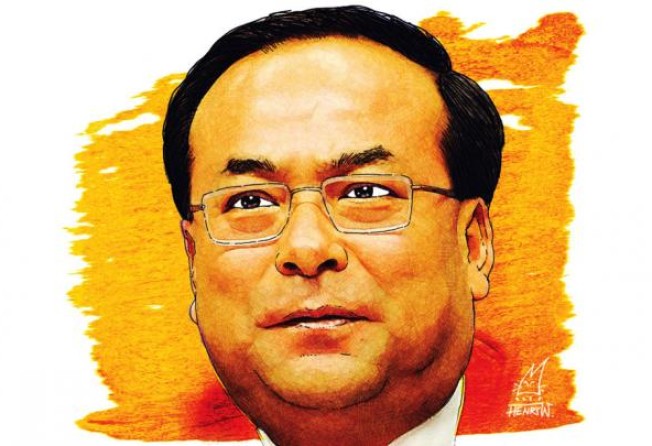
Sun Zhengcai is being tipped as a future top leader
One of the youngest provincial party chiefs, Sun Zhengcai is tipped to be a future top leader for his efforts inbooming Jilin

He was once the youngest government minister on the mainland. Now he serves as one of the youngest provincial party chiefs, and is a powerful contender for a future top leadership post.


In a political system where rosy economic indicators still count in evaluations of government officials' performance, such top marks can only help Sun's standing with the party elite.
The newspaper's eight-page report, which included a lengthy interview with Sun on Jilin's growth strategy, was interpreted by some analysts as an endorsement by the central government. Sun told People's Daily he adhered to the central government's strategy of emphasising economic restructuring and improving social welfare.
Industrial strongholds like Jilin must ensure their economic base allows for flexibility to guard against unsustainable development, Sun said in the interview. He emphasised the importance of boosting agricultural output and eliminating the widening wealth gap between urban and rural people.
Tenure as Jilin's party boss has prepared Sun for promotion to the top of the party, according to Dr Bo Zhiyue, a senior researcher at the National University of Singapore. Before Sun was put in charge of Jilin, he was party secretary of Shunyi district outside Beijing.
"To govern a vast country like China, a national leader must have both local and central experience. The front runners are then recruited to the Politburo and positioned to take over from the preceding generation," Bo wrote in East Asian Policy in 2010.
"As party secretary of Jilin, Sun seems to be following in the footsteps of Hui Liangyu , currently vice-premier in charge of agriculture. Most significantly, Sun is a strong candidate for the premiership after Li Keqiang ," he said.
Sun was appointed minister of agriculture in 2006 following a long career in the sector. According to reports, he keeps a copy of a debit note written in 1934 by the Chinese Red Army for grain borrowed from peasants. It serves as a reminder of "the farmers' contribution to the country".
Sun was born in Wulongzui in Rongcheng , Shandong province in 1963 and obtained his bachelor's degree from Laiyang Agricultural Institute in 1984. He earned a master's degree from the Beijing Academy of Agriculture and Forestry Sciences three years later. He is said to have been a top student, who would give up holidays to remain on campus to study.
Zhao Jiuran , a classmate of Sun's at the academy, described him as a troubleshooter, extremely diligent and meticulous. "His academic training gave him the ability to identify and solve problems, no matter how complicated they might be," Zhao told Global People, a magazine under People's Daily, in a 2009 interview.
Sun devoted time to studying English, according to Zhao, allowing him to go and study in Britain for one year. It is not clear when or where Sun pursued his studies in that country.
In his hometown, Sun is remembered as one of the hardest-working students in his high school. He was always polite, said several elderly residents of Wulongzui village, who were quoted in mainland media.
"People didn't have much money back in the 1970s," said one of his high school classmates, surnamed Qiu. "We had to bring our own basic meals to school … and so did Sun. We used to go home together on weekends, but Sun was always the first to go back to school for studying."
At 1.8 metres, Sun played basketball at college, but he later gave it up to spend more time studying, according to Zhao.
After graduation, Sun worked at the Beijing academy for 10 years, becoming vice-president and deputy secretary. He also obtained a doctorate at the China Agriculture University in 1997.
That same year, Sun was transferred to Beijing's Shunyi district as deputy director, marking the start of his political career. The suburban district is known for its agricultural sector, allowing Sun to hone his expertise.
He was promoted to district party chief in February 2002 and three months later elected as a standing member of Beijing's party committee.
From there, he appears to have been fast-tracked for promotion. He was appointed general secretary of Beijing's municipal party committee in November, 2002. Four years later, he became minister of agriculture, one of the country's youngest ministers ever.
A major test of Sun's crisis management ability came with the nationwide scandal over melamine-adulterated milk. At least six babies died and more than 300,000 developed kidney problems in 2008 when the industrial chemical melamine was found to have been added to dairy products to fake protein content.
The Ministry of Agriculture, though not directly in charge of quality supervision, had responsibilities to ensure the overall safety of agricultural products.
But it also had to protect the interests of more than two million dairy farmers, who were hard hit when dairy firms stopped buying from them. Sun's ministry, along with others, authored a series of policies to support farmers across 12 provinces. Public confidence in the dairy industry wavers to this day, however.